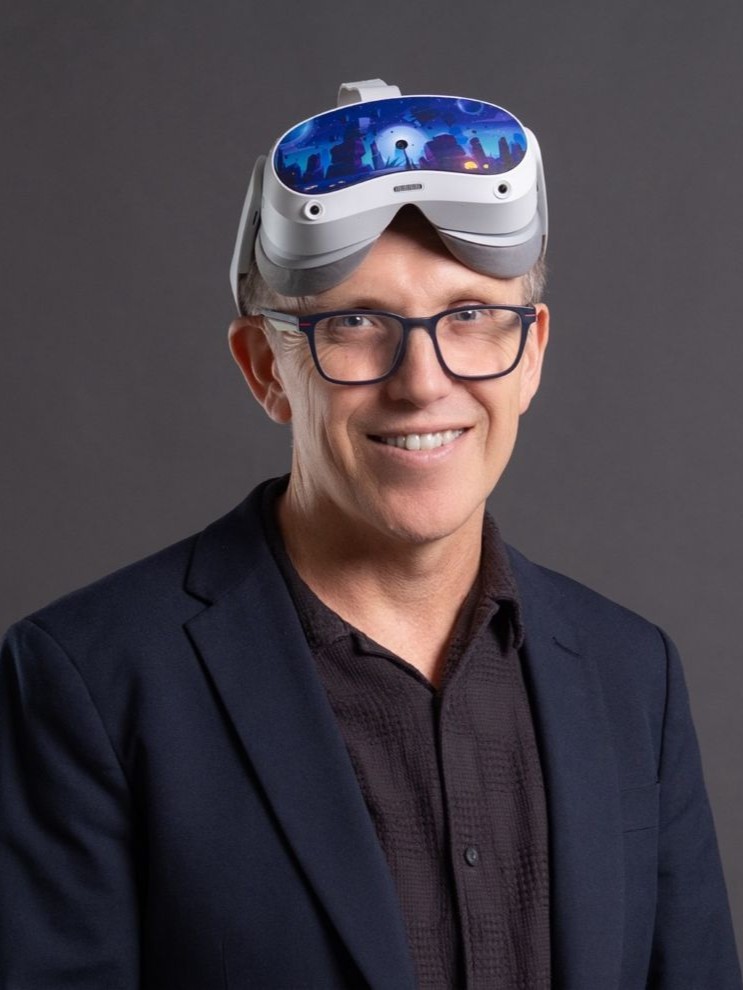Since August 2023 I have been a Professor in Digital Creativity in the School of Design and Creative Arts at Loughborough University. Previously, I worked for 23 years at the University of Nottingham as a Professor of Human Factors and was head of the Human Factors Research Group (2019-2023). I am an experienced lecturer who teaches and conducts research in Human Factors and Human-Computer Interaction. My research interests concern the human-centred design of disruptive technologies in complex contexts, including novel information and automation systems within future vehicles – and most recently, the impact of virtual/augmented reality and holograms in the Higher Education sector.
Throughout my career, I have received over £20M in funding from industry, UK government, EU and charities – and have published over 300 peer-reviewed papers, with greater than 6000 citations in total. I currently contribute to the influential work of the JISC steering committee for Extended Reality in the UK, am an elected member of Innovate UK’s Immersive Tech Network Accessibility working group, and am Associate Editor for the international journal, ‘Virtual Worlds’.
My research has primarily focused on the Human Factors design issues for future vehicles - particularly Human-Machine Interface (HMI) design. This has involved many high-impact collaborations with the automotive industry investigating cutting-edge digital technologies, such as Augmented Reality (AR), gesture-based interaction, natural and conversational AI language assistants, and so on. Moreover, much of my research has been conducted within sophisticated immersive Virtual Reality (VR) driving simulator facilities – enabling research to be conducted in a safe, controlled and cost-effective environment. More recently, I have been conducting research in collaboration with students and staff focused on the impacts of virtual and augmented reality - this time within the education and creative design sectors. In particular, I have been investigating how university students engage with these technologies (through surveys and observations) – particularly when embodied as an avatar for their learning. Studies have addressed a range of research questions, e.g. the potential for impairment avatars to allow students to better understand what it might be like to have cataracts, be colour blind, be in a wheelchair, etc. or how social VR can be used for engaging and effective team-building/ cohesion activities.
A final strand of research is considering the potential of cutting-edge hologram technology usually used in entertainment fields (e.g. ABBA Voyage) in education. For instance, we have been ‘beaming in’ guest speakers from across the globe into Loughborough teaching spaces as holograms to deliver talks/lectures. Research questions consider how students and the guest speaker perceive and behave in these novel contexts. Moreover, I am now exploring how hologram technology can be used to enhance students’ digital creativity, for instance empowering them to use principles of magical theatre to show themselves and their digital artifacts in new/exciting ways.
I have taught thousands of undergraduate and postgraduate students about the importance and practice of Human Factors and HCI/User-Experience Design for over 20 years, acting as lead for modules in many different areas (e.g. cognitive/physical ergonomics, emotional design, research methods, HCI and interface design). Most notably, for several years I innovated considerably within a module, “Simulation and Virtual Reality” engaging with 100s of students as avatars solely in fantastical Metaverse teaching worlds. This work led to me being shortlisted for a prestigious Times Higher Education award for “most innovative teacher” in 2023.
At Loughborough, I lead a pioneering module “Interaction Design for Immersive Futures” DSP830 for the MSc in User-Experience Design in which all students are loaned a VR headset for the whole semester and use this technology to join certain classes completely in VR and collaboratively design virtual worlds with their fellow students.
I also actively contribute to a range of other modules within the School, providing expertise in novel means of engaging with students using VR and hologram technology, including:
- ACP203: Design Teams – Using VR to teach team-work skills/attitudes
- DSC201: Inclusive Design – Using VR to teach designers empathy skills, especially in relation to those with visual/mobility impairments
- DSP106: Data Collection and Analysis – Teaching Task Analysis
- ACB208 : Drawing Characters: Representation and Identity – Designing and embodying different avatars in social VR to understand how ‘self’ in brought to design
- ACB132: Developing Individual Practice – Working with creative arts students to enhance digital creativity
- DSP866: Major project for User-Experience Design
Finally, within the University Digilabs initiative I am setting up and running numerous social VR classes and hologram lectures for other Schools, highlighting the wide range of use-cases for this technology in Higher Education, including:
- Geography: Use of VR for virtual field trips; hologram guest speaker from Finland
- Biological/Natural Sciences: Use of VR for teaching cell biology
- Sports Management: Use of VR to teach students how to comprehend large-scale sports events (e.g. within stadia)
- Economics: Hologram guest speaker from US
I am currently supervising the following students within the School:
- Tianying Guo Guo – External Human-Machine Interfaces for fully automated vehicles: A study of social influence using Virtual Reality (since Oct 2025)
- Xinxin Lu - Cultural Heritage in the Metaverse: The Role of New Technologies in Enhancing Empathy for an Artist’s Work (since Jan 2025)
- Yuting Cheng - Enhancing Aesthetic Engagement and Narrative Comprehension: A Comparative Study of Virtual Reality Modes for Chinese Scroll Paintings (since Oct 2024)
- David Hosseini - Incomplete Spaces: How Narrative Designers Use Holarchic Storytelling to Expand Their Storyworlds in Video Games (since Oct 2023)
In addition, I continue to assist in the supervision of students at the University of Nottingham.
